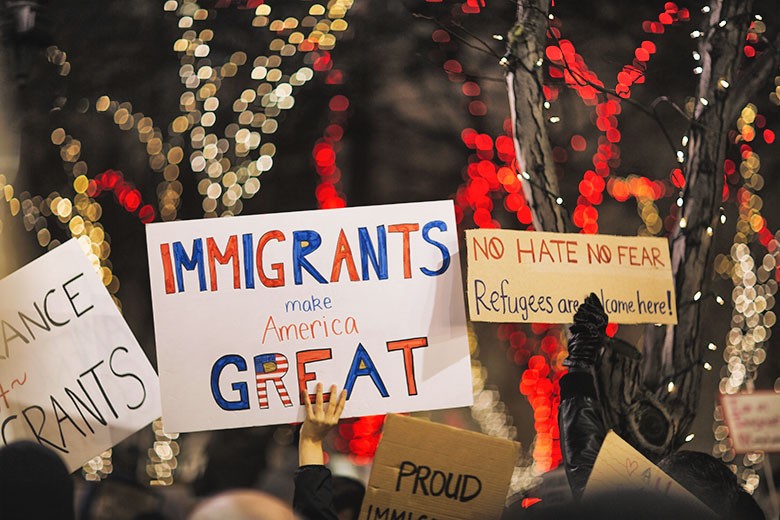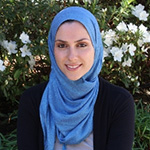
I recently made the difficult decision to send my daughter to a counselor. At her first session, she was so overcome with emotion that she could barely string together a few sentences. How did we get to this point?
Last November, my daughter and I were featured in a video in which we cooked a traditional Syrian holiday meal during Thanksgiving. While many people shared warm and encouraging comments, some comments left us flabbergasted: “This is exactly why Trump wants to get rid of all these minority traitors. GO HOME.” Knowing that somebody watched my beautiful daughter cook with her mother and felt inspired to spew out hateful rhetoric in response was deeply disheartening.
Protecting our children is the most fundamental parental instinct. When our children fall, we pick them up and kiss their scrapes. When they encounter a bully on the playground, our blood boils as we restrain our desire to run to their rescue. So what are parents to do when the bully is our own president who continues to divide our country and encourage xenophobia?
Van Jones of CNN encapsulated the nightmare of a Trump presidency best on election night when he said, “It’s hard to be a parent tonight for a lot of us. You tell your kids, ‘Don’t be a bully.’ You tell your kids, ‘Don’t be a bigot.’ You tell your kids, ‘Do your homework and be prepared.’ And then you have this outcome, and you have people putting children to bed tonight, and they’re afraid of breakfast. They’re afraid of ‘How do I explain this to my children?’” Explaining a Trump presidency to our children was just the beginning. In the months after, our children have been watching on the sidelines—every tweet, news broadcasting debate, and heated dinner conversation—left to piece together discombobulating and fragmented bits of information.
In an op-ed I wrote for the San Francisco Examiner, I talked about the painful dinner conversation I had with my eleven year old son shortly after discovering that Trump would become our next president. My son caught me off guard when he asked if we would be placed in internment camps like the Japanese. My nine year old daughter listened to this conversation unfold and ended up in tears. This was my first glimpse into life as a parent in a post-Trump era.
My son is now twelve, and my daughter is ten, but not much has changed to ease their fears as Muslim Syrian Americans. One day, I surprised my children with tickets to the Ice Cream Museum. We drove downtown in the evening and parked the car about half a mile away. As we walked toward the museum, my daughter looked at a stranger we passed on the street and said “hello” in a shaky voice. Anyone who knows my daughter knows this is very out of character for her. She is extremely shy and barely says hello to close family friends.
“Why are you talking to a stranger?” I asked.
“Because I think maybe if I say ‘hello’ he won’t hurt me,” she responded.
This was the moment I knew something was terribly wrong.
When we got home, I called my daughter into my room to follow up on this incident. She burst into tears and expressed that ever since Trump became president, she lives in constant fear of someone hurting her. She said it is especially intense when she walks in public with me, a visible hijab (Muslim religious head covering) wearing Muslim woman. She stated that she wanted to move to Canada and didn’t feel safe in America. My heart ached. I couldn’t help but reflect on my own fears due to a rise in anti-Muslim hate crimes—the images I get of a man suddenly stabbing me on the bus, or cursing at me on the street. I wondered if I had inadvertently expressed these fears to her somehow.
When I asked my daughter’s permission to write an article about her experience, she initially resisted because she worried that someone who reads the article may find her and hurt her. Her concern was all the more reason to spread awareness about this topic. Perhaps knowing my daughter’s story can melt away the hate and foster greater compassion and understanding. My daughter has become one of the countless children who now live in fear since Trump came into power. While she has the support of her family and the luxury of seeking professional help, many children suffer in silence. Safety represents the second tier in Maslow’s hierarchy of human needs. Our children deserve to feel safe. Our children need to feel safe.
Photo via Unsplash.com.
 About Sana Khatib
About Sana Khatib
Sana Khatib is a proud Syrian American Muslim who lives in the Bay Area with her husband and two children. As the daughter of Syrian immigrants who fled from political persecution decades ago, she feels grateful to live in a country that protects her right to practice her beliefs and speak out against injustice.